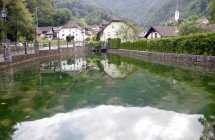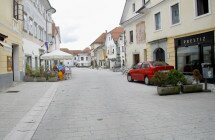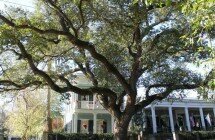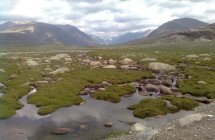I step out onto the sidewalk as a crowd moves slowly down the street. Not just any crowd. A protest. They proudly carry banners with their messages written in German. The sound of upbeat music resonates from a large truck with speakers on top as the crowd marches down the street chanting an unintelligible phrase. As a foreigner with only an intermediate knowledge of German, I can’t quite make it out. I left the Reichstag, a building steeped in German history, to investigate. We proceed to meander along with the stream of people out of curiosity more than anything. The street was dark and artificially lit with streetlights, but still early in the evening. I may not be able to understand all of what they are saying; however, I can read most of the signs. “Ihr seit nicht das Volk!” (You are not the people), read one. Another written in English helped me understand the issue a little more. It simply read, “I love foreigners, immigrants, and refugees.” They seem harmless so I wander through the mob. The pace is slow enough to move in and out without much trouble. The crowd begins to fan out around the truck with the speaker as it had stopped just in front of the Brandenburg Gate. The speaking started again, but this time in English.
I will offer some context to this protest. About a week prior in Paris a Muslim extremist had attacked a Parisian satirical newspaper named Charlie Hedbo killing 12 people. After which the response from many very conservative Europeans had been one against immigration. They perceived the actions of this one man as the dangers of immigration and open borders. As a rebuttal, many groups around Europe and Germany specifically were demonstrating against the suggested closed border policies. Now after this tragic event, I am standing in Berlin, a city formerly surrounded by a wall, observing a peaceful demonstration in front of two iconic German monuments.
The message came from a diminutive woman. She speaks with passion about the dangers of stereotypes, the power of positive voices, and about future demonstrations. The message is even more powerful when I realize the truck is parked in what would have been no man’s land 25 years ago. A place where people risked life and limb to cross a border and scale a wall within their own city.
I walked away from the crowd over to a bench in a nearby park. Many of these Berliners were older, and many would have been alive or at least heard stories of the Wall. These people were no different than you or I except that they have lived in a divided country. One with closed borders, surrounded by a wall, and maybe that is why they protest so fervently against the building of a theoretical wall of tight borders.
This experience hit home. In the United States, we decry those who cross our borders illegally. We rail on our political podiums against immigrants, yet we fail to understand the human side of the equation. We proclaim this the land of the free but guarantee it only to those who have won the genetic lottery by being born here. My travel, especially in Berlin, has informed no more than informed, challenged my views of issues in my own country. It has made me appreciate the shortcomings of my country while also making me a better global citizen. It has fundamentally changed me for the better and connected me with different people with differing views. After all, isn’t that what travel is all about?
This was a contest submission by Adam Carrier.
Updated: August 25, 2015













